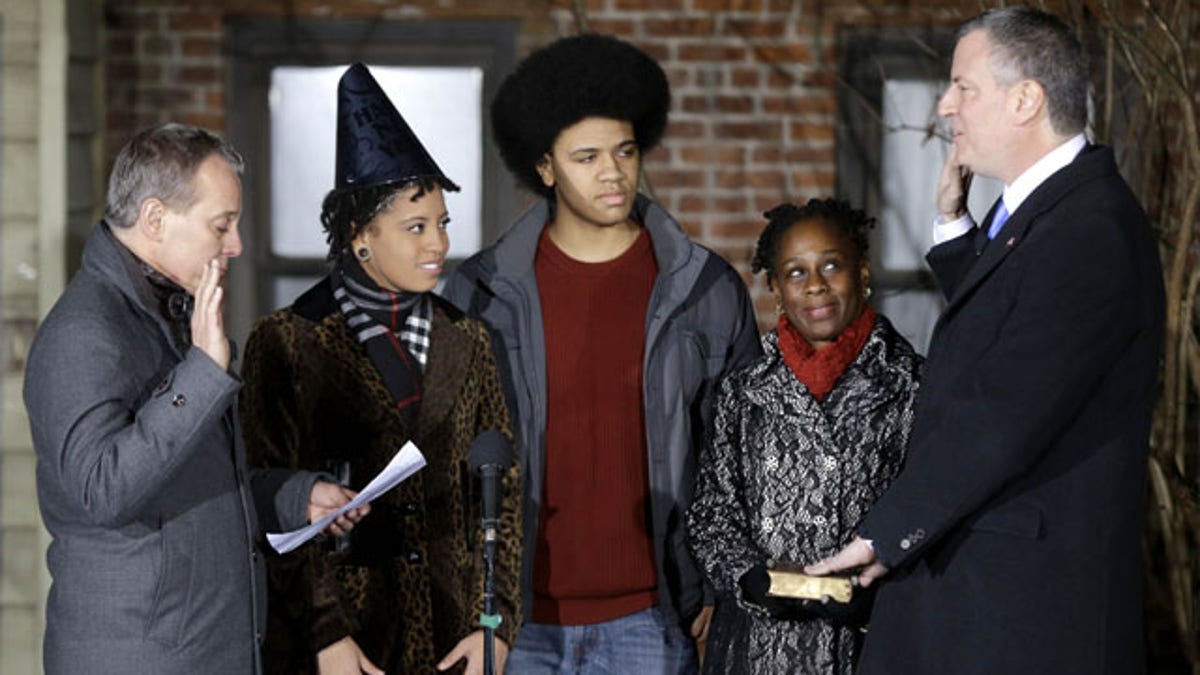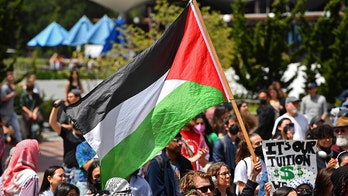
January 1, 2013: Bill de Blasio, right, is sworn in as the mayor of New York City by State Attorney General Eric Schneiderman, left, while his family, Chiara de Blasio, second from left, Dante de Blasio, center, and Chirlane McCray look on. De Blasio took the oath of office moments after midnight at his home in Park Slope, Brooklyn. (AP Photo)
Bill de Blasio was sworn in as the 109th mayor of New York City on Wednesday, becoming the first Democrat to occupy City Hall in more than two decades while vowing to pursue a sweeping liberal agenda for the nation's largest city.
De Blasio took the oath of office moments after midnight in front of his modest Brooklyn home. His inauguration was to be celebrated on a far grander scale at noon on the steps of City Hall when he takes the oath again, administered by former President Bill Clinton.
The new mayor was elected two months ago by a record margin on the promise of being a sharp break from Michael Bloomberg, who leaves office after 12 years that reshaped New York, making it one of the nation's safest and most prosperous big cities but also one that has become increasingly stratified between the very rich and the working class.
De Blasio, 52, was joined in the first minutes of 2014 by his wife, Chirlane McCray, and their two teenage children, a close-knit interracial family who played a central role in his campaign and to some are a further symbol of a new era after the data-driven, largely impersonal Bloomberg years.
"To everyone, this is the beginning of a road we will travel together," de Blasio said after taking the oath administered by state Attorney General Eric Schneiderman.
The inauguration portended to be a joyous day for city Democrats, who outnumber Republicans in the city by a margin 6-to-1 but have been shut out of power since David Dinkins left office on New Year's Day 1993.
The party's ascension was underscored by the presence of Clinton and his wife, former Secretary of State Hillary Clinton, who is mulling a presidential run in 2016.
Both Clintons have ties to de Blasio: the new mayor worked for the former president's administration in the Department of Housing and Urban Development and helped manage Hillary Clinton's successful 2000 Senate campaign. De Blasio and his wife are also frequently compared to the Clintons since McCray has long been considered the new mayor's most powerful, if informal, adviser.
De Blasio, an unabashed progressive who touts his Brooklyn roots, takes office at a crucial juncture for the city of 8.4 million people.
As New York sets record lows for crime and highs for tourism, and as the nearly completed One World Trade Center rises above the Manhattan skyline, symbolizing the city's comeback from the Sept. 11, 2001 terror attacks, many New Yorkers have felt left behind during the city's renaissance.
De Blasio reached out to those he contended were left behind by the often Manhattan-centric Bloomberg administration, and he called for a tax increase on the wealthy to pay for universal pre-kindergarten.
He also pledged to improve economic opportunities in minority and working-class neighborhoods and decried alleged abuses under the police department's stop-and-frisk policy. He and his new police commissioner, William Bratton, have pledged to moderate the use of the tactic, which supporters say drives down crime but critics claim unfairly singles out blacks and Hispanics.
Bratton was also sworn in just after midnight, receiving the oath of office at police headquarters.
De Blasio's inauguration culminates a remarkable political journey. For more than a decade, he was a political insider, working not just for the Clintons but also Dinkins and now-Gov. Andrew Cuomo. He was then elected to the city council, representing his home neighborhood for two terms.
He then served as public advocate, the city's official watchdog, and used the obscure and under-funded post to launch his mayoral bid. He was mired in fourth for much of the primary before the candidacies of several better-known opponents -- including Christine Quinn and Anthony Weiner -- imploded. He then coasted to a general election rout over his Republican opponent Joe Lhota, a former deputy mayor under Rudy Giuliani.




